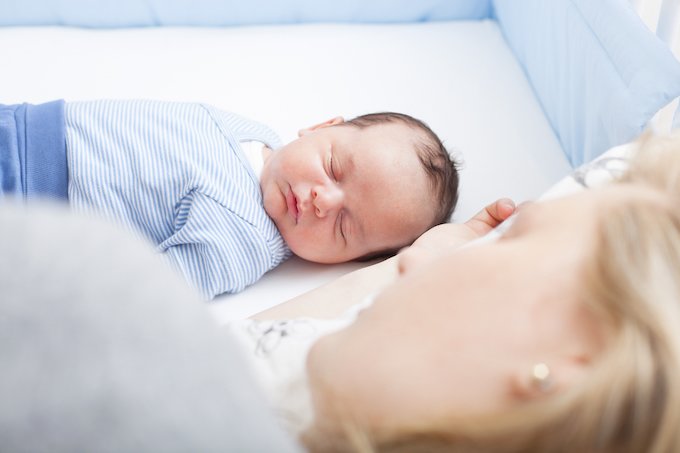The 4 Biggest Benefits of Co-Sleeping
Being accessible to your baby is as essential for you as it is for your new little one. Find out the four biggest co-sleeping benefits and how to make sure you’re doing it safely.
The term “co-sleeping” doesn’t just mean bed sharing. It can be any form of children sleeping in the same room as their parent. It’s commonly practiced in many cultures around the world—whether by necessity or choice.
Many modern parents intend for their new baby to sleep in his own room. But it doesn’t always work out that way.
Table of contents
Co-Sleeping Doesn’t Automatically Mean Bed Sharing
First things first – co-sleeping generally doesn’t mean the baby sleeps in between the parents in the same bed. It just means the newborn sleeps in the same room as the parents.
Most often, this happens in a bassinet near the bed or a co-sleeper (a type of bassinet with a side that drops down for easy access from the parent’s bed).
In some cases, parents will move the baby’s crib into their room for the first three months or so. This way, the baby isn’t in a room all alone and parents can respond much more quickly. If you’ll be using a crib for your baby, check out this guide to choosing a nontoxic crib mattress to make sure they’re not inhaling chemical fumes.
72% of postpartum women reporting waking up tired and getting less than seven hours of sleep at night. And countless sleep-deprived parents have experimented and found sleep strategies that work, with co-sleeping being a worldwide favorite.
The Benefits of Co-Sleeping
By sleeping in the same room as your child, not only are you able to sense your baby’s needs more easily, but you also can meet those needs more quickly. But the co-sleeping benefits don’t end there.
According to Dr. William Sears, pediatrician and author of The Baby Sleep Book, “Sharing sleep involves more than a decision about where your baby sleeps. It is a mindset, one in which parents are flexible enough to shift nighttime parenting styles as circumstances change. Every family goes through nocturnal juggling acts at different stages of children’s development.”
Sharing sleep reflects an attitude of acceptance of your baby as a little person with big needs. Your infant trusts that you, his parents, will continually be available during the night, as you are during the day. Sharing sleep in our culture also requires that you trust your intuition about parenting your individual baby instead of unquestionably accepting the norms of American society.
Accepting and respecting your baby’s needs can help you recognize that you are not spoiling your baby or letting him manipulate you when you welcome him into your bed.
Co-Sleeping Helps Baby Sleep Through the Night
With your baby sleeping in the same room, you easily sense your baby’s distress before he startles or starts to cry, which releases adrenaline, raises heart rate and blood pressure, making it harder for him to fall back asleep.
Research has shown that co-sleeping newborns startle and cry significantly less than solo-sleepers. And if your newborn wakes and cries less during the night, everyone gets better sleep (source).
Co-Sleeping Reduces the Risk of SIDS
The American Academy of Pediatrics recommends that parents share a room with their newborn for the first six months because co-sleeping reduces the risk of sudden infant death syndrome. International research shows that countries with the lowest SIDS rates are where co-sleeping is the norm, not the exception.
Keeping this recommendation in mind, co-sleeping with your baby reduces many sleep safety risks. Sharing a room with your newborn gives you the ability to immediately respond to her needs.
Co-Sleeping Allows for Longer Sleep Intervals for Parents
Parents also benefit from co-sleeping, with many finding more restful nights and a closer connection to their child. Parents get more sleep with co-sleeping because they lose less sleep from nighttime feedings.
It may seem like waking up and walking down a hallway to feed your newborn wouldn’t impact your sleep, but it does. Changing position and even light activity make it harder to fall back to sleep. Feeding while co-sleeping just requires rolling over and sitting up, helping you get back to sleep faster.
It’s not just parents who fall asleep faster with this feeding situation. In fact, one study has found that newborns who feed while co-sleeping actually have shorter wake times and fall back asleep faster too. Co-sleeping helps everyone get better sleep.
Co-Sleeping Can Foster a Greater Connection With Your Baby
Many parents who co-sleep express feeling more in sync with both the biological and emotional needs of their children. It is common knowledge that physical touch is essential to healthy child development, but parents also benefit from physical contact with their children. Touch for parents stimulates the release of oxytocin. This hormone strengthens the connection between parent and child.
Many parents believe this connection fostered during co-sleeping makes them more empathetic and mindful of their children as they grow older. If you want to foster a greater connection with your child, co-sleeping might be the answer for your family.


